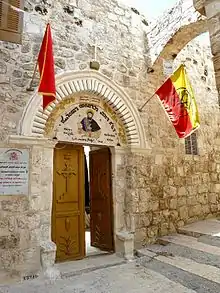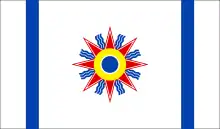Arameans in Israel
Arameans in Israel are a Christian minority residing in Israel. They claim descent from the Arameans, an ancient Semitic-speaking people in the Middle East in the 1st millennium BC.
 | |
| Total population | |
|---|---|
| up to 15,000[1] | |
| Regions with significant populations | |
| Tel Aviv, Jerusalem, Bethlehem, Nazareth, Jericho, Jish, Kafr Bir'im | |
| Languages | |
| |
| Religion | |
| Syriac Christianity (Maronite Church, Syriac Catholic Church, Syriac Orthodox Church) | |
| Related ethnic groups | |
| Maronites in Israel, Assyrians in Israel |
Some Syriac Christians in the Middle East espouse an Aramean ethnic identity and a minority in Syria still speak a Western Aramaic language, although the Eastern Aramaic languages are far more widely spoken. Most of the Arameans in Israel are part of the Syriac Orthodox Church and the Maronite Church.[2] Until 2014, self-identified Arameans in Israel used to be registered as ethnic Arabs or without ethnic identity. However, since September 2014, Christian families or clans who can speak Aramaic and/or have an Aramaic family tradition are eligible to register as ethnic Arameans in Israel.[3]
In October 2019, the Israel Christian Aramaic Organization estimated the number of Israeli citizens, who are eligible to obtain Aramean affiliation at 15,000.[1]
History
Abraham who's being viewed as the founder of monotheism in Judaism, Christianity and Islam was believed to be of Aramean ancestry. In Judaism he's seen as the Patriarch of the Jewish people. [4][5][6]
Aramean prescense in Israel goes back to 1100 BCE, when much of Israel came under Aramean rule for eight years according to the Biblical Book of Judges, until Othniel defeated the forces led by Chushan-Rishathaim, the King of Aram-Naharaim.[7] After the Arameans converted to Syriac Christianity they became involved in the expansion of Christianity troughout the Middle-East, which resulted in various Syriac monasteries and churches being build especially in Jerusalem and Bethlehem of whom the Monastery of Saint Mark, Jerusalem among the oldest. According to a 6th-century inscription Inscription at the Monastery of St Mark's in Jerusalem found during a restoration in 1940, the church is on the ancient site of the house of Mary, mother of St. Mark the Evangelist (Acts 12:12) and the place of the Last Supper of Christ with His disciples. Some Christians believe that the Last Supper was held at the nearby Cenacle on Mount Zion.[8]
Around 1831 large numbers of Arameans started to emigrate to Israel as pilgrims and settled there, mostly originating from the Tur Abdin region.[9] During the Seyfo: the genocide on Aramaic-speaking Christians in the Ottoman Empire a large mass emigration occurred from Tur-Abdin. They mainly settled in Jerusalem, Bethlehem and in smaller numbers in Jericho and Nazareth. In Bethlehem they also constructed the Virgin Mary church between 1922 and 1928 in the Syriac Quarter.
After the advent of Zionism and Israel’s occupation of Jerusalem in 1967, hundreds of Arameans were expelled and their homes and shops given over to Jewish settlers. Today, the Syriac Quarter area is part of the Armenian and Jewish Quarter - which expanded to several times its original size through the dispossession of 6,000 non-Jewish residents.[10]
Demographics
The first person to receive the "Aramean" ethnic status in Israel was 2 year old Yaakov Halul in Jish on October 20, 2014.[11] In July 2016, an article in the Ha'aretz estimated the number of Israeli Christians eligible to register as Arameans in Israel to be 13,000.[12] In October 2019, the Israel Christian Aramaic Organization estimated the number of Israeli citizens, who are eligible to obtain Aramean affiliation at 15,000.[1]
Recognition in Israel
Legal recognition
In September 2014, Ministry of the Interior Gideon Sa'ar instructed the PIBA to recognise Arameans as an ethnicity separate from Israeli Arabs.[3][13] Under the Ministry of the Interior's guidance, people born into Christian families or clans who have either Aramaic or Maronite cultural heritage within their family are eligible to register as Arameans. About 200 Christian families were thought to be eligible prior to this decision.[14] According to an August 9, 2013 Israel Hayom article, at that time an estimated 10,500 persons were eligible to receive Aramean ethnic status according to the new regulation, including 10,000 Maronites (which included 2,000 former SLA members) and 500 Syriac Catholics.[15]
The first person to receive the "Aramean" ethnic status in Israel was 2 year old Yaakov Halul in Jish on October 20, 2014.[11]
Another milestone in recognising Aramean minority as a distinct culture in Israel was made by Israeli court in 2019, which ruled that Aramean minority could choose Jewish or Arab education, rather than making children with Aramean identity to be automatically designated to Arabic-language schools.[1]
Controversy
The recognition of the Aramean ethnicity caused mixed reactions among Israeli minorities, the Christian community, and among the general Arab Israeli population. Whilst some celebrated the success of their long legal struggle to be recognised as a non-Arab ethnic minority, other members of the Arab community in Israel denounced it as an attempt to divide Arab Christians.[16] Representatives of the Greek Orthodox Patriarchate of Jerusalem officially denounced the move.[16]
Many in Israeli academia advocate the recognition of the Aramean identity and have called on the government of Israel to promote the awareness regarding this issue on the basis of the international principle of ethnic self-determination as espoused by Wilson's 14 points.[17] One of the staunchest supporters of the recognition of the Aramean identity is Father Gabriel Naddaf, who is one of the leaders of the Christians in Israel. He advocated on behalf of his Aramean followers and thanked the Interior Ministry's decision as a "historic move".[18]
See also
External links
References
- "Aramaic Maronite Center". Aramaic-center.com. Archived from the original on 2016-07-01. Retrieved 2012-11-26.
- Yalon, Yori (17 September 2014). "'Aramean' officially recognized as nationality in Israel". Israel Hayom. Retrieved 14 December 2014.
- My father was a wandering Aramean who went down to Egypt with a small household and lived there as a nomad. But there he became a nation great, strong, and numerous. Deuteronomy 26:5
- https://www.jpost.com/blogs/standing-against-the-wind/parshat-ki-tavo-a-wandering-aramean-413777
- https://books.google.nl/books?hl=nl&lr=&id=An08DwAAQBAJ&oi=fnd&pg=PR13&dq=Abraham+Aramean&ots=jC1eeDTb1z&sig=3BAoCF5GG0lNdXDTwOjCU7egLgw#v=onepage&q=Abraham%20Aramean&f=false
- Boling, Robert G., revised by Richard D. Nelson, Harper Collins Study Bible: The Book of Judges
- https://bethbc.edu/blog/2017/03/28/syriacs-still-going-strong/
- https://openjlem.hypotheses.org/1655
- https://www.middleeasteye.net/features/syriac-christians-palestine-keep-hope-alive-amid-fears
- Newman, Marissa (21 October 2014). "In first, Israeli Christian child registers as Aramean". The Times of Israel. Retrieved 14 December 2014.
- "הבעיה האמיתית של ספר האזרחות החדש". www.haaretz.co.il.
- Aderet, Ofer (September 9, 2018). "Neither Arab nor Jew: Israel's Unheard Minorities Speak Up After the Nation-state Law". Haaretz.
- Lis, Jonathan (17 September 2014). "Israel recognises Aramean minority in Israel as separate nationality". Haaretz. Retrieved 17 December 2014.
- Cohen, Ariel (28 September 2014). "Israeli Greek Orthodox Church denounces Aramaic Christian nationality". Jerusalem Post. Retrieved 14 December 2014.
- "Is There Really an Aramean Nation?". Israel National News.
- "New Nationality for Christians: Aramaean". Israel National News.
Sources
- Hasegawa, Shuichi (2012). Aram and Israel during the Jehuite Dynasty. Berlin-Boston: Walter de Gruyter.
- Lemaire, André (2019). "The Boundary between the Aramaean Kingdom of Damascus and the Kingdom of Israel". Aramaean Borders: Defining Aramaean Territories in the 10th–8th Centuries B.C.E. Leiden-Boston: Brill. pp. 245–266.
- Levin, Yigal (2017). "My Father was a Wandering Aramean: Biblical Views of the Ancestral Relationship between Israel and Aram". Wandering Arameans: Arameans Outside Syria: Textual and Archaeological Perspectives. Wiesbaden: Harrassowitz Verlag. pp. 39–52.
- Lipiński, Edward (2000). The Aramaeans: Their Ancient History, Culture, Religion. Leuven: Peeters Publishers.
- Mazar, Benjamin (1962). "The Aramean Empire and Its Relations with Israel". The Biblical Archaeologist. 25 (4): 97–120.
- Zwickel, Wolfgang (2019). "Borders between Aram-Damascus and Israel: A Historical Investigation". Aramaean Borders: Defining Aramaean Territories in the 10th–8th Centuries B.C.E. Leiden-Boston: Brill. pp. 267–335.


